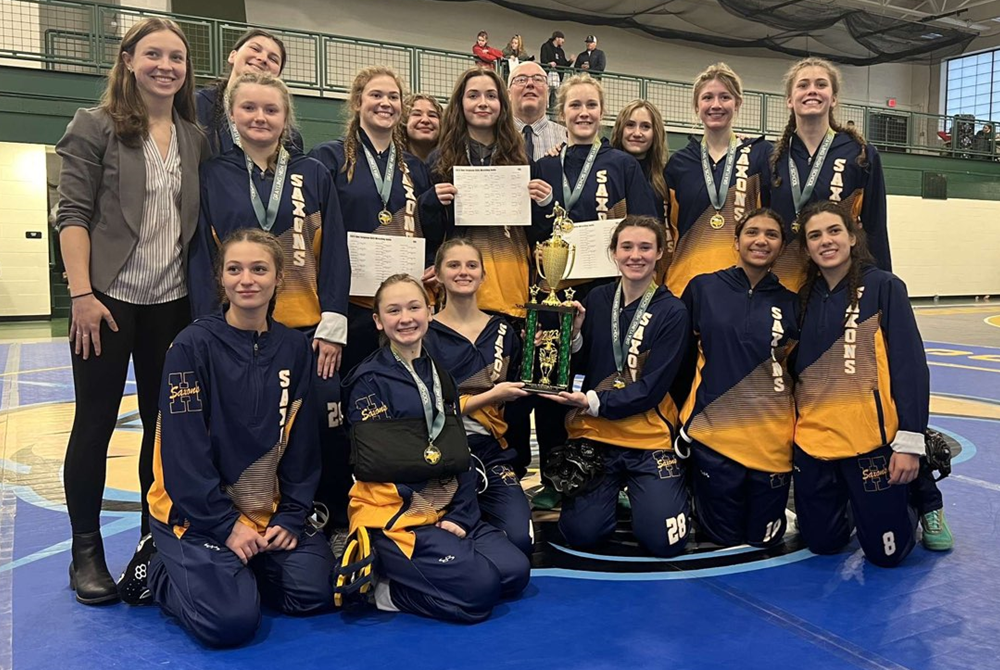
Hastings Among Statewide Pacesetters as Girls Wrestling Enjoys Rapid Growth
By
Steve Vedder
Special for MHSAA.com
January 12, 2024
Sophia Sunior thought the mat might be the perfect place to learn something new about herself.
 So after hanging around a handful of Hastings boys wrestling practices a year ago, the Saxons senior opted to join the school's fledging girls team. As a former swimmer and current softball player, Sunior considered herself competitive. But the real attraction to wrestling, said Sunior, was to test her own mental and physical boundaries.
So after hanging around a handful of Hastings boys wrestling practices a year ago, the Saxons senior opted to join the school's fledging girls team. As a former swimmer and current softball player, Sunior considered herself competitive. But the real attraction to wrestling, said Sunior, was to test her own mental and physical boundaries.
At first, Sunior struggled with the decision as she met with little success against more experienced wrestlers. But little by little, Sunior began to improve. And that's when she began to discover critical pieces about herself.
"For me, a lot of it was mental," Sunior said. "But I became stronger mentally and physically. Wrestling is probably one of hardest sports there is. It's almost legalized fighting, and I've learned so much about myself. My motto is if I can wrestle, I can do anything. You can learn some of the best (teaching) tools about yourself you can get."
While Sunior started last season slowly, she finished with a bang, placing eighth at MHSAA Individual Finals at 190 pounds. She's started this season with seven wins over her first eight matches.
Sunior is part of what Hastings coach Mike Goggins believes is the largest girls wrestling team in the state with 16 athletes. Goggins, who coached the Hastings boys team for 38 years, switched over to the girls program two years ago. Hastings had five Finals qualifiers and three placers last season.
Goggins isn't necessarily surprised that girls wrestling has caught on at Hastings, which has long had a quality boys program with Goggins' teams winning 11 league championships, 10 Districts and one Regional title and totaling 28 Individual Finals placers under his guidance.
The ability to build a program has carried over to the girls. The team had 14 wrestlers a year ago, and this season’s competitors have come from a variety of backgrounds. Of the 16 total, seven are first-year wrestlers. Three are first-year varsity letter winners, while two play basketball, two tennis, two softball, and one is a volleyball player.
“It's really kind of taken off," Goggins said of the sport. "A lot of the girls had shown interest in boys wrestling, and then when we offered wrestling for the girls, we began to get numbers. I'm not terribly surprised by that. Just the experience of what the girls saw with the boys, I just think they wanted an opportunity."
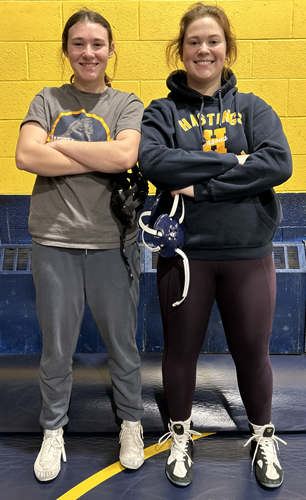 MHSAA participation surveys show 100-150 girls regularly participating in wrestling during the end of the first decade of the 2000s, but numbers began growing substantially to match the introduction of a state individual tournament by the Michigan Wrestling Association (the state coaches association) during the 2018-19 season and then the addition of a girls-only division to the MHSAA Individual Finals in 2022. Goggins said the vast majority of girls would much rather compete against girls. “I'd say 10 to 12 of our wrestlers will say no thanks to wrestling against boys, and that's absolutely fine,” he said.
MHSAA participation surveys show 100-150 girls regularly participating in wrestling during the end of the first decade of the 2000s, but numbers began growing substantially to match the introduction of a state individual tournament by the Michigan Wrestling Association (the state coaches association) during the 2018-19 season and then the addition of a girls-only division to the MHSAA Individual Finals in 2022. Goggins said the vast majority of girls would much rather compete against girls. “I'd say 10 to 12 of our wrestlers will say no thanks to wrestling against boys, and that's absolutely fine,” he said.
MHSAA assistant director Dan Hutcheson noted girls wrestling has nearly tripled from 495 athletes who completed an Alpha weigh-in in 2019-20 to 1,332 this winter.
"The goal is we hope it keeps growing to where schools have complete lineups," Hutcheson said. "Wrestling is a sport you can do on your own and if you put in the work, you can be successful.
"We don't know how or to what point it grows, but it's been at a nice clip."
Goggins said the sport's next hurdle indeed will be fielding enough teams for dual meets. Hastings has gone to three tournaments, which included plenty of travel to East Jackson, Grayling and Montague. The Montague event had 52 competitors, but weekend tournaments can be a numbers struggle as most teams are never able to field a complete lineup. That leaves organizers with the challenge of organizing brackets to fit the participants.
When there are enough girls for more teams to fill the standard 14 weight classes, the sport will likely grow even more, Goggins contends.
One of his first decisions as girls coach was to hire a female assistant in his daughter, Erin Slaughter, also the school's volleyball coach. Goggins, the school's athletic director, said the move means girls don't have to turn to a male coach for advice. "It's added a certain comfort level," he said.
While Sunior is one of the most experienced wrestlers, first-year senior Skylar Fenstemaker said she has her own reasons for joining the program.
"It's a challenge," she said. "Just the physical commitment and how hard (you) have to work. And I wrestle because I like being part of a team and the bond you have with the other girls. You learn that you have to work hard to get what you want."
PHOTOS (Top) The Hastings girls wrestling team celebrates its team championship at the Grayling Invitational this season. (Middle) First-year wrestler Skylar Fenstemaker, left, and returning Finals placer Sophia Sunior are two of 16 athletes on the team. (Photos courtesy of the Hastings girls wrestling program.)
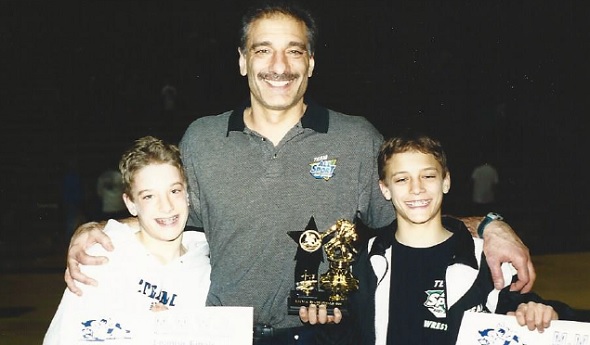
Coaching Cousins Build on Macomb Roots
By
Tom Markowski
Special for Second Half
January 18, 2018
MACOMB – Success must begin somewhere.
 And for the Macomb Dakota wrestling program, its beginnings can be traced to a church in Mount Clemens nearly 25 years ago.
And for the Macomb Dakota wrestling program, its beginnings can be traced to a church in Mount Clemens nearly 25 years ago.
Ed Skowneski, a longtime educator in Macomb County who was a football star at Wayne State University during the 1970s, got with a few buddies and formed a youth wrestling program named the Bad Boys Wrestling Club.
This program would eventually produce six MHSAA champions and approximately 20 others who reached the Individual Finals. It also helped inspire two of those wrestlers to become coaches at the high school level.
Eddie Skowneski, Ed's son, leads the Macomb Dakota program ranked No. 3 in Division 1 this week by Michigan Grappler. Nephew Anthony Biondo assists top-ranked Detroit Catholic Central.
Before the Bad Boys – which would eventually evolve into Team All Sport – there were pockets in the county where the sport thrived, such as Fraser High where Al Kastl had built a strong program. But for the most part, Macomb County was a step or two behind nearby counties such as Genesee, Lapeer, Oakland and Wayne, where the sport had well-established programs like Clarkston, Davison, Detroit Catholic Central, Hazel Park, Lake Orion, Montrose, New Lothrop and others.
Skowneski teamed with people like Bob Palazzolo, Rick Julien – an assistant under Kastl at Fraser who later became Fraser’s head coach – and later, Vince Biondo, Skowneski’s roommate in college, to organize a competitive youth program.
“We had some good kids back then,” Skowneski said. “We had six state champions come out of there. We practiced twice a week at the church, but it was more like a hall or reception room. After one year we moved to Fraser, Mark Twain Elementary (School), where I was a principal. That made it easier, for travel and everything. We had our own mats in the school, and it started to grow.”
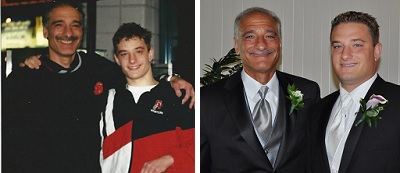 A team from Macomb County has yet to reach an MHSAA Division 1 Final, but they’re getting close. Last season Dakota reached a Division 1 Semifinal for the first time, and it was just the third time a Macomb County team had advanced that far in the top division/classification.
A team from Macomb County has yet to reach an MHSAA Division 1 Final, but they’re getting close. Last season Dakota reached a Division 1 Semifinal for the first time, and it was just the third time a Macomb County team had advanced that far in the top division/classification.
Two other county schools fared well last season, too, in other divisions. Warren Woods Tower lost in the Division 2 Final to Lowell, and Richmond won the Division 3 title.
Skowneski’s motivation to become a coach came from his son, Eddie, and, later, his nephew Anthony Biondo, Vince Biondo’s son. Eddie Skowneski got his start with the Bad Boys at age 9 with his cousin who is two years younger. The two became best friends and would become two of the county’s top wrestlers during the early to mid-2000s at Clinton Township Chippewa Valley.
Each would reach the Individual Finals three times. In 2003, Skowneski won the 140-pound title over fellow county wrestler Justin Petrone of Roseville, 1-0. Biondo was a three-time champion placing first at 103 in 2003, first at 112 the next season and first at 145 in 2006.
Skowneski would earn a scholarship to Michigan State University, where he was a three-year starter. Biondo went to University of Michigan and was a three-time NCAA Tournament qualifier. His best season came as a senior when he went 2-2 at the NCAAs and earned his 100th career win.
“Those Bad Boys days, those were some great times,” Anthony Biondo said. “It was a great group of kids. I just remember being in that church with Uncle Ed. I really wasn’t into wrestling when I started. I was into hockey and football. I started going there one day a week, and it just grew. My first year wrestling (at Chippewa Valley), I won the state title. It was just that one-on-one thing that I liked. My dad was a huge goal-setting type of guy, and I just kept at it.”
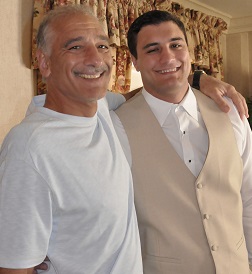 Their wrestling careers didn’t stop after graduation. Skowneski became an assistant coach at Fraser for one season then went to Warren DeLaSalle for two as an assistant before becoming the head coach at Dakota in 2012. Biondo is in his seventh season as an assistant coach at Detroit Catholic Central, the top-ranked team and reigning champion in Division 1.
Their wrestling careers didn’t stop after graduation. Skowneski became an assistant coach at Fraser for one season then went to Warren DeLaSalle for two as an assistant before becoming the head coach at Dakota in 2012. Biondo is in his seventh season as an assistant coach at Detroit Catholic Central, the top-ranked team and reigning champion in Division 1.
Eddie Skowneski, 31, said he’s had a number of mentors throughout his wrestling career who have contributed to him becoming the coach he is today. His father is one, but he also said his high school coach John Jeffire at Chippewa Valley, St. Clair Shores Lakeview football coach Pat Threet and his college coaches all have had their influence.
When Ed Skowneski retired as school principal at Mark Twain in 2015, his son quickly found him a part-time job as his assistant at Dakota to keep him active.
“He’s always been a great coach,” Eddie said. “Coaching with my dad, it never really stopped. With him, it’s the little things. He always said, if you have good technique, you can beat someone who is more physical than you are. With my dad, he goes to each person and shows them the proper technique. With me, sure I want them to work and train hard. But I want my wrestlers to do it the right way.”
Ed Skowneski got out of coaching when his son went to high school. He said he had taken his son as far as he could and that it was better to have Eddie continue his progression with someone else as his coach.
Now that Ed’s back in it, coaching with his son no less, he couldn’t be happier.
“When he first got the job at Dakota, I thought of helping him but I just didn’t have the time,” Ed Skowneski said. “I’m enjoying it now. I’m not the head coach. He has the issues. I just work with the kids. It’s fantastic. It’s rewarding. We have a great group of kids and good parents.
“I look forward to the tournaments, which sometimes keeps me up at night. It’s nice that my son and I can do this together.”
 Tom Markowski is a columnist and directs website coverage for the State Champs! Sports Network. He previously covered primarily high school sports for the The Detroit News from 1984-2014, focusing on the Detroit area and contributing to statewide coverage of football and basketball. Contact him at [email protected] with story ideas for Oakland, Macomb and Wayne counties.
Tom Markowski is a columnist and directs website coverage for the State Champs! Sports Network. He previously covered primarily high school sports for the The Detroit News from 1984-2014, focusing on the Detroit area and contributing to statewide coverage of football and basketball. Contact him at [email protected] with story ideas for Oakland, Macomb and Wayne counties.
PHOTOS: Longtime coach Ed Skowneski stands with son Eddie (left) and nephew Anthony Biondo after a youth event when they were children. (Middle) Father and son hold up Eddie’s bracket sheet after he won the Division 1 championship at 145 pounds in 2006; to the right, they pose together during Biondo’s wedding. (Below) Ed Skowneski and Biondo, also before the latter’s wedding. (Photos provided by the Skowneski family.)

